
views
Embrace your individuality.

View your flaws as what makes you an individual. We’re all human, and we all have flaws, quirks, or oddities that sets us apart from others. Instead of viewing your flaws as bad things, reframe them into what makes you a unique person. For instance, maybe you feel like you aren’t as good at math or history as your classmates are. However, that same quality might also mean that you’re great at art or are awesome at English. Or, maybe you have a birthmark or a beauty mark that you aren’t too fond of. However, that mark might make you stand out from a crowd and draw people toward you.
Use your flaws to relate to others.

Flaws make us human, so try to bond with others about them. Maybe you and your best friend are both super clumsy, or perhaps you meet someone else who has braces or headgear, too. When you admit to your flaws, you show your vulnerability, which makes people like you even more. Plus, finding out that other people are flawed in the same way as you can help you feel less alone.
Find role models with similar flaws.
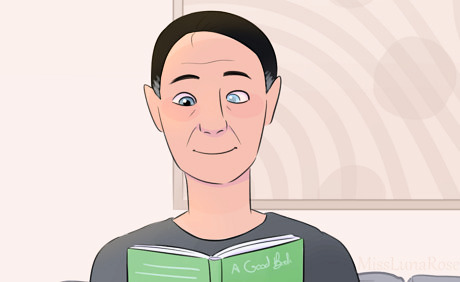
Look up to people who are similar to you to feel great. Maybe your favorite author is amazing at describing characters, but they don’t have the best social skills. Or, maybe your parents are awesome at throwing events and hosting, but they’re also super forgetful. Find people that you admire who have similar flaws as you, and you’ll soon find that you’re much more accepting of yourself.
Know the difference between a quirk and a problem.
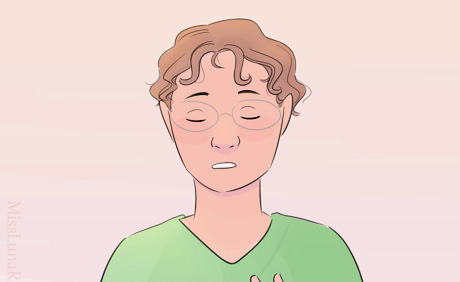
Your quirks don’t need changing, while problems are something to work on. A quirk may be unusual, but it’s harmless. A problem is something that’s harmful to you or other people (physically or emotionally). You can embrace and see the upsides of your quirks without trying to change them. However, problems are something to work on. Examples of quirks: a big nose, gap teeth, fidgeting a lot, excitability, being obsessed with cats Examples of problems: a hot temper causing you to lash out, unhealthy eating habits, making rude jokes, unsafe driving habitsTip: Try to address your problems by redirecting the energy behind them. If you have a hot temper, you might be passionate, and you need to focus that passion without taking your frustrations out on other people. Or if you tend to indulge in too much comfort eating, find other ways to comfort yourself and de-stress on a regular basis. Recognize your needs and values. Then imagine how to handle them better.
Set realistic standards for yourself.
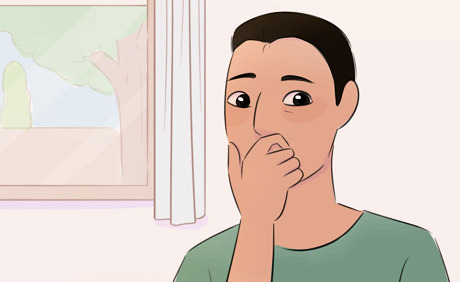
Avoiding perfectionism will help you stress less about your flaws. We are often our own worst critics, and we tend to hold ourselves to standards that we wouldn’t expect of other people. Think about the standards you set for yourself, and then think about if you’d hold a friend or loved one to the same standards. If you wouldn’t, then you don’t need to hold yourself to those standards either. Try to avoid that nagging voice inside of your head that tells you that you’re not good enough or that you’re only going to be happy when you achieve some unachievable status.
Focus on how you feel, not how you look.

Embrace your personality instead of your appearance to feel good. It’s easy to get caught up in feeling like we don’t look “good enough,” especially with the rise of social media. To get away from any unrealistic beauty standards, try to focus on how you feel instead: are you happy? Are you relaxed? The way you feel is much more important than how you look. Other ways to stop focusing on your appearance include: Wearing clothes that you feel comfortable and confident in Smiling more Focusing on what your body can do instead of how it looks
Don’t compare yourself to others.

Hold yourself to your own standards, not anyone else’s. While it can be tough to do, try not to compare yourself to your peers or the people you see online. Everyone’s life path is different, and you don’t need to match someone else’s journey. Be grateful for what you do have, and think about how far you’ve come to make it where you are today. It can be super tough to stop comparing yourself to others, especially on social media. Remember that people generally only share the good parts of their lives online, and chances are, they’re making themselves look way better than they actually are for the camera.
Recognize your own self-worth.

You are worthy of being loved and cared for. You don’t need to measure up to anyone else’s standards to have high self-esteem. Instead of relying on other people to lift you up, do it yourself. Take stock of your own talents and abilities, and don’t let anyone else get you down. Try to remove the word “should” from your vocabulary. “I should be better at this…” “I should be as good as my peers…” Turn those “shoulds” into “coulds:” “If I practice, I could be a lot better in just a few months,” “If I start now, I could achieve my goals in no time.”
Reframe your negative thoughts.
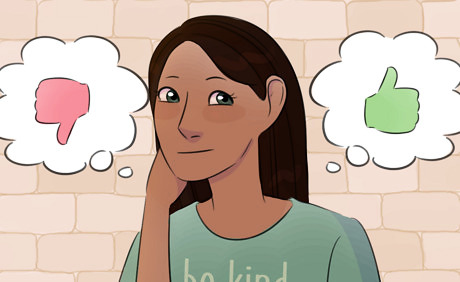
Challenge your inner critic to think highly of yourself. Oftentimes, our “flaws” are simply things we don’t like about ourselves; they aren’t necessarily bad things. Whenever you catch yourself thinking negatively about something, ask yourself questions like, “Is that really true?” or, “What evidence do I have to support that?” Then, reframe the thought to turn it into a positive. For instance, maybe you think, “I’m too sensitive.” Reframe that by saying: “My sensitivity makes me caring, kind, and empathetic.” Maybe you think, “I’m so stubborn.” Turn that into a positive by saying, “I’m passionate about the things that I care about.”
Accept compliments from others.
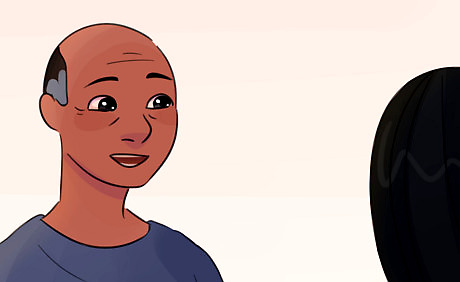
Compliments from your loved ones can boost your self-image. When someone tells you something they like about you, do your best to say “thank you,” and take what they said to heart. Remember, most people won’t compliment you unless they truly mean it—if they say something kind about you, they want you to feel good. Accepting compliments gets easier the more you compliment others. The next time you’re out and about or with friends, try to give out at least 3 compliments. Chances are, you’ll feel great!
Surround yourself with people who support you.

Hang out with people who make you feel good about yourself. Your friends and family members often have your best interests at heart, and they’ll want to boost your self-esteem as much as they can. Do your best to be around the people in your life who love and support you for who you are right now. On the flip side, try to watch out for people who bring you down or point out your flaws often. These people often don’t have your best interests at heart, and spending too much time with them can make you feel worse about yourself instead of better.
Ask for help if you need it.

Talk to a professional if you’re struggling with your self-esteem. It’s natural to struggle or feel down about yourself sometimes. A mental health professional can help you work through your feelings and figure out where they come from. They can also give you the tools you need to reframe your thoughts and become a happier, more confident person.















Comments
0 comment